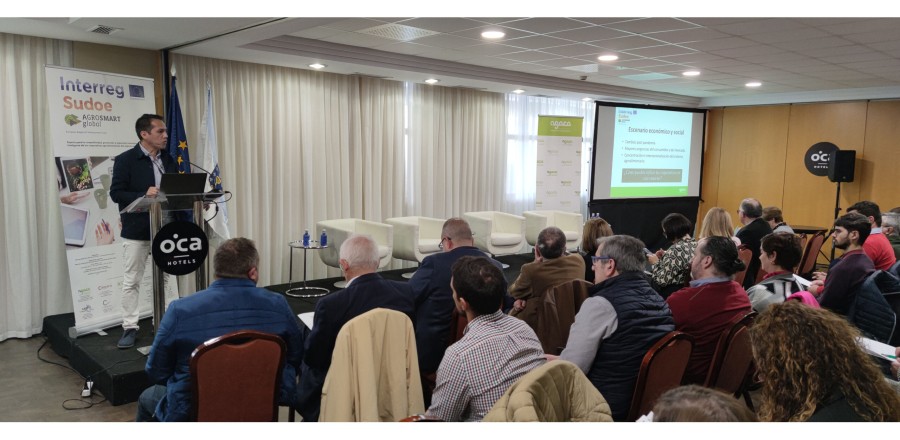Internationalization and employment, keys to the competitiveness of rural cooperatives and SMEs

On the 29th of november the regional seminar of the European AGROSMARTglobal project took place in Santiago de Compostela. Specialists in e-commerce, internationalization and labor insertion analyzed the situation of rural areas and cooperatives and the frequent problems and shortcomings in terms of employment.
The conference “Smart innovation in the social and rural economy“, which was held within the framework of the AGROSMARTglobal project, sought to give visibility to the options for digital innovation, employment and good practices that the social economy promotes in the rural and agri-food field. The objective of the project is the interconnection, interaction and competitiveness of the agri-food cooperatives of Spain, France and Portugal through processes, tools and advanced support services that facilitate the positioning, promotion and intelligent international expansion of the entities, in addition to seeking strategies for digital marketing that bet on inter-company cooperation.
The first thematic block, moderated by Ana Olveira, president of the Union of Cooperatives ESPAZOCOOP, was entitled “The successes of digitization in small and medium-sized companies”. Maravillas Rojo showed good practices in new methods and models and cooperative management thanks to digitization and electronic commerce followed by Abacus, the entity that he chairs, which has 560 employees.Jessica Gregori, who is director of the Galicia Delegation of Redflexión, a consultancy specialized in competitive intelligence and internationalization, focused on e-commerce in the international arena. Among the recommendations, they agreed that although technology, be it digital commerce platforms or customer management softwares, is key to success, it must have a trained and trained human team behind it to maintain good service and relationship with consumers.
Employment was discussed at a round table, entitled “A pact for agricultural employment and job placement“, which was moderated by Isabel Fraga, president of Aeiga (Association of Job Placement Companies of Galicia).
Both the agri-food sector and the rural communities require labor, as indicated by Ángel Miranda, director of the agricultural and livestock division of the CLUN cooperative, who focused on the situation of the dairy sector, while Lucía Aparicio, psychologist from the Rural Development Center Portas Abertas, listed key conditions for success in job placement. They agreed on the importance of providing suitable training both to those who demand employment and to those who provide it, in addition to generating steady employment opportunities that help settle the population.
Another of the topics discussed was the hiring of foreigners. Saray Durán (Secretary of EAPN Galicia and General Director of Ecos do Sur) highlighted the need to invest not only in time to solve bureaucracy, but also in housing and resources that enable a good quality of life. Óscar Freire (attached to the management of the Provincial Agrarian Cooperative of A Coruña) showed the experience of te cooperative integrating migrants into its staff, for which they follow a comprehensive accompaniment, from communication their duties the communication of duties and remuneration to the finding housing, training and resolution of procedures.
Regarding youth, Nuria Fernández, representing the Euroeume Rural Development Association, presented Nó Rural, an initiative for the return and job placement of youth in rural areas with the aim of creating a collaboration network between agents that work with the youth and offer an internship service in companies, in addition to identifying opportunities for entrepreneurship by mapping potentially available land and housing.
Claudia Rodríguez, from the Alén cooperative, presented the Guide to good practices in Sustainable Development Goals in Galician agri-food cooperatives, prepared in collaboration with AGACA. The guide, in addition to showing ways in which cooperatives already operate in a “triple sustainability: social, economic and environmental”, offers guidelines to assess the degree to which an entity meets the SDGs or can work towards achieving it.
Carmen Rodríguez, president of AGACA, reiterated the need to collaborate to overcome challenges. Celso Gándara, president of ForoESGal, stressed that “access to employment can be a real opportunity” for rural cooperatives that are in a position to offer services related to emerging needs such as the care economy. The final speech was made by the Regional Minister for the Promotion of Employment and Equality, María Jesús Lorenzana, who counted 14,000 people in Galicia who work in the Social Economy, which totals 3,000 entities and accounts for 7% of GDP: “We need to influence the consolidation of social economy entities and the search for new sectors, because I believe that you are the solution to many of Galicia’s problems”.


